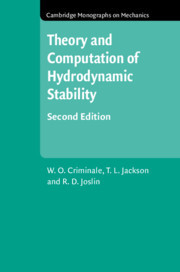Description
Theory and Computation in Hydrodynamic Stability (2nd Ed., Revised edition)
Cambridge Monographs on Mechanics Series
Authors: Criminale W. O., Jackson T. L., Joslin R. D.
Offers modern and numerical techniques for the stability of fluid flow with illustrations, an extensive bibliography, and exercises with solutions.
Language: English
Subject for Theory and Computation in Hydrodynamic Stability:
Approximative price 68.67 €
In Print (Delivery period: 14 days).
Add to cart
Theory and Computation in Hydrodynamic Stability (2nd Ed.)
Publication date: 12-2018
562 p. · 15.2x22.8 cm · Paperback
Publication date: 12-2018
562 p. · 15.2x22.8 cm · Paperback
Approximative price 135.14 €
In Print (Delivery period: 14 days).
Add to cart
Theory and Computation in Hydrodynamic Stability
Publication date: 12-2018
562 p. · 15.6x23.5 cm · Hardback
Publication date: 12-2018
562 p. · 15.6x23.5 cm · Hardback
Description
/li>Contents
/li>Biography
/li>
The study of hydrodynamic stability is fundamental to many subjects, ranging from geophysics and meteorology through to engineering design. This treatise covers both classical and modern aspects of the subject, systematically developing it from the simplest physical problems, then progressing to the most complex, considering linear and nonlinear situations, and analyzing temporal and spatial stability. The authors examine each problem both analytically and numerically. Many relevant fluid flows are treated, including those where the fluid may be compressible, or those from geophysics, or those that require salient geometries for description. Details of initial-value problems are explored equally with those of stability. The text includes copious illustrations and an extensive bibliography, making it suitable for courses on hydrodynamic stability or as an authoritative reference for researchers. In this second edition the opportunity has been taken to update the text and, most importantly, provide solutions to the numerous extended exercises.
1. Introduction and problem formulation; 2. Temporal stability of inviscid incompressible flows; 3. Temporal stability of viscous incompressible flows; 4. Spatial stability of incompressible flows; 5. Stability of compressible flows; 6. Centrifugal stability; 7. Geophysical flow; 8. Transient dynamics; 9. Nonlinear stability; 10. Transition and receptivity; 11. Direct numerical simulation; 12. Flow control and optimization; 13. Investigating hydrodynamic instabilities with experiments; Appendix A. Mathematical formulas; Appendix B. Numerical methods; Appendix C. Solutions to exercises; References; Author index; Subject index.
W. O. Criminale is Professor Emeritus in the Department of Applied Mathematics at the University of Washington. His research focuses on the areas of initial-value problems in shear flows, large-scale oscillations in turbulent flows, mixing, and nonlinear mechanics. Professor Criminale is the recipient of many honors, which include: the Alexander von Humboldt Senior Research Award; Fellow, American Physical Society; Guest Scientist, Stanford–Ames Turbulence Research Center; the Faculty Research Award, Battelle Pacific Northwest Laboratories; and Royal Society Fellow in the UK.
T. L. Jackson is a Research Professor in the Department of Mechanical and Aerospace Engineering at the University of Florida. He is currently a Fellow of American Physical Society (APS), an Associate Fellow of American Institute of Aeronautics and Astronautics (AIAA), a member of the Combustion Institute and a member of American Society of Mechanical Engineers (ASME). He was previously an Associate Editor for the AIAA Journal, and he currently serves on the Editorial Advisory Board for the Journal of Propulsion and Power. His expertise is in the area of basic fluid mechanics, combustion, stability, solid propellant combustion, energetic material modeling and the large-scale simulation thereof.
R. D. Joslin is a permanent Program Director in the Engineering Directorate at the US National Science Foundation in Alexandria, Virginia. He manages the Fluid Dynamics Program and other cross-Foundation programs. Dr Joslin was previously a Program Manager at the Office of Naval Research, where he managed the Turbulence, Stratified Wakes, Submarine Maneuvering, Ocean Energy, Multi-Platform Interactions and Supercaviation Programs. He is a member of the American Physical Society (APS), American Society of Mechanical Engineers (ASME) and is an Associate Fellow in the American Institute of Aeronautics and Astronautics (AIAA). His areas of expertise include fundamental fluid mechanics, turbulence and t
T. L. Jackson is a Research Professor in the Department of Mechanical and Aerospace Engineering at the University of Florida. He is currently a Fellow of American Physical Society (APS), an Associate Fellow of American Institute of Aeronautics and Astronautics (AIAA), a member of the Combustion Institute and a member of American Society of Mechanical Engineers (ASME). He was previously an Associate Editor for the AIAA Journal, and he currently serves on the Editorial Advisory Board for the Journal of Propulsion and Power. His expertise is in the area of basic fluid mechanics, combustion, stability, solid propellant combustion, energetic material modeling and the large-scale simulation thereof.
R. D. Joslin is a permanent Program Director in the Engineering Directorate at the US National Science Foundation in Alexandria, Virginia. He manages the Fluid Dynamics Program and other cross-Foundation programs. Dr Joslin was previously a Program Manager at the Office of Naval Research, where he managed the Turbulence, Stratified Wakes, Submarine Maneuvering, Ocean Energy, Multi-Platform Interactions and Supercaviation Programs. He is a member of the American Physical Society (APS), American Society of Mechanical Engineers (ASME) and is an Associate Fellow in the American Institute of Aeronautics and Astronautics (AIAA). His areas of expertise include fundamental fluid mechanics, turbulence and t
© 2024 LAVOISIER S.A.S.




